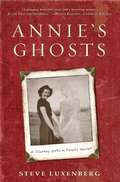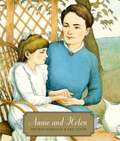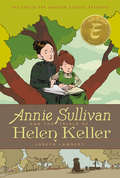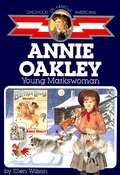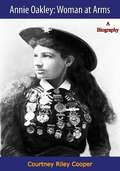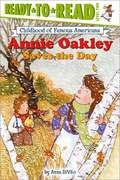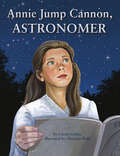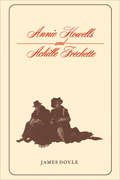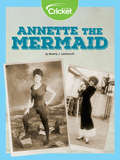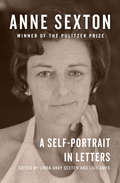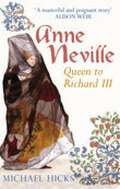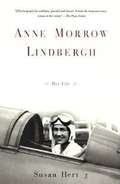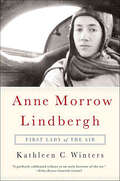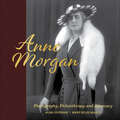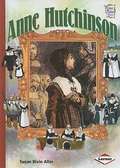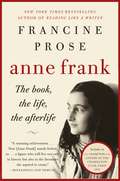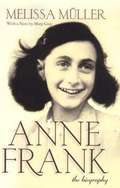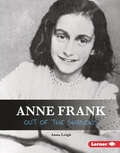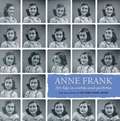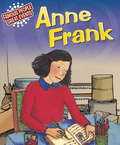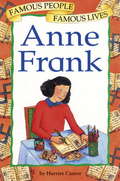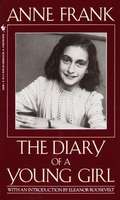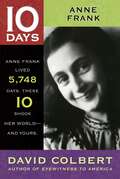- Table View
- List View
Annie's Ghosts: A Journey into a Family Secret
by Steve LuxenbergCombining the power of reportage with the intrigue of mystery, "Annie's Ghosts" explores the nature of self-deception and self-preservation. The result is equal parts memoir and riveting detective story as one son seeks to uncover family secrets.
Annie's Coming Out
by Rosemary Crossley Anne McdonaldA story which is a triumph for the human spirit and for the power of compassion Confined to an institution because of her physical disabilities since the age of three, Annie is hardly alive when Rosemary, an assistant to the hospital psychiatrist, discovers her. Together they battle against physical impediment, obdurate and uncaring bureaucracy and public apathy to find a new life for Annie outside--a life which has dignity, hope and love.
Annie and Helen
by Deborah Hopkinson"What is breathtakingly shown here, through accurate, cross-hatched watercolor paintings; excerpts from Sullivan&’s correspondence to her former teacher; and concise and poetic language, is the woman&’s patience and belief in the intelligence of her student to grasp the concepts of language," praised School Library Journal in a starred review.Author Deborah Hopkinson and illustrator Raul Colón present the story of Helen Keller in a fresh and original way that is perfect for young children. Focusing on the relationship between Helen and her teacher, Annie Sullivan, the book is interspersed with excerpts of Annie's letters home, written as she struggled with her angry, wild pupil. But slowly, with devotion and determination, Annie teaches Helen finger spelling and braille, letters, and sentences. As Helen comes to understand language and starts to communicate, she connects for the first time with her family and the world around her. The lyrical text and exquisite art will make this fascinating story a favorite with young readers. Children will also enjoy learning the Braille alphabet, which is embossed on the back cover of the jacket.
Annie Sullivan and the Trials of Helen Keller (The Center for Cartoon Studies Presents)
by Joseph LambertHelen Keller lost her ability to see and hear before she turned two years old. But in her lifetime, she learned to ride horseback and dance the foxtrot. She graduated from Radcliffe. She became a world famous speaker and author. She befriended Mark Twain, Charlie Chaplin, and Alexander Graham Bell. And above all, she revolutionized public perception and treatment of the blind and the deaf. The catalyst for this remarkable life's journey was Annie Sullivan, a young woman who was herself visually impaired. Hired as a tutor when Helen was six years old, Annie broke down the barriers between Helen and the wider world, becoming a fiercely devoted friend and lifelong companion in the process. In Annie Sullivan and the Trials of Helen Keller, author and illustrator Joseph Lambert examines the powerful bond between teacher and pupil, forged through the intense frustrations and revelations of Helen's early education. The result is an inspiring, emotional, and wholly original take on the story of these two great Americans.
Annie Oakley: Young Markswoman
by Ellen WilsonFocuses on the childhood of the famous American sharpshooter.
Annie Oakley: Woman at Arms, A Biography
by Courtney Riley CooperNot long ago, Annie Oakley died, and bequeathed to the famous comedian, Fred Stone, her diaries and personal papers. Adding to personal knowledge, Courtney Ryley Cooper, well-known author and friend of Buffalo Bill, has written a splendid biography.It is a true American epic—the story of a pioneer, who as a little girl was forced to forage with her gun in order that her family might not starve, and who eventually became, with Buffalo Bill, internationally famous as a trick marksman, the idol of youth and the darling of royalty.
Annie Oakley Saves the Day
by Anna DiVitoAs young Annie Oakley -- then Annie Mosey -- sees her father off to the mill, she notices the gray sky. It looks like snow, which means a dangerous trip for Father. To take her mind off her worries, Annie shows her brother how to build a trap, just the way their father showed her. Little does she realize just how important this lesson will soon be....
Annie Jump Cannon, Astronomer
by Carole Gerber"Parents and teachers ask me for the names of books for their primary school children. I'm honored to recommend Annie Jump Cannon, Astronomer by Carole Gerber, an excellent book about a true astronomical pioneer." -Paul Kohlmiller, editor, San Jose Astronomical Association newsletter This brilliantly illustrated children's book depicts the achievements of a woman who developed an important system of classifying stars. To this day, Annie Jump Cannon holds the record for identifying more stars than anyone else in the world. In 1925, she became a professor of astronomy at Harvard and the first woman to receive a doctor of science degree from Oxford University. Born during the Civil War, Cannon was determined to pursue a career in astronomy. From her childhood days of studying the constellations with her mother, to her education at Wellesley College and her job in the Harvard Observatory, this biography follows Cannon's inspirational path to success. The story notes the challenges the astronomer faced, such as an illness that left her partially deaf and gender discrimination, while capturing her shining moments as she worked to become the "census-taker of the stars."
Annie Howells and Achille Fréchette
by James DoylePost-Confederation Ottawa sets the scene for this fascinating biography of a literary couple. The marriage of Annie Howells and Achille Fréchette in 1877 brought together two literary families and two cultural traditions. Annie was the daughter of the US consul in Quebec, William Cooper Howells, and sister of the American novelist William Dean Howells. Achille, a translator for the Canadian House of Commons, was the brother of the French-Canadian poet Louis Fréchette. Both Annie and Achille were authors themselves, and their lives and careers touched frequently Ottawa's political, cultural, and religious life. In Ottawa the Fréchettes established themselves at the centre of a distinguished bilingual circle of politicians, poets, and scholars. Their friends included Wilfrid Laurier, Alphonse Lusignan, and, in later years, Archibald Lampman. Both Fréchettes continued to pursue the literary careers they had begun before their marriage. Annie published a serialized novel and many short stories and articles; Achille's poems continued to appear in various periodicals. Achille also took part as writer and trustee in a bitter debate over separate schools. The many surviving letters between Annie and her brother William cover various topics of mutual interest to Canadians and Americans, reflecting both Canadian and American cultural experience in the late nineteenth and early twentieth centuries.
Annette the Mermaid
by Beverly J. LetchworthThe idea that physical exercise is good for men and women alike is something we take for granted today, but people didn’t always believe this was true. There was a time when exercise was not considered proper or healthy for women. Thanks to athletes like Annette Kellerman, women have come a long way since then.
Anne Sexton: A Self-Portrait in Letters
by Anne SextonA revealing collection of letters from Pulitzer Prize–winning poet Anne Sexton While confessional poet Anne Sexton included details of her life and battle with mental illness in her published work, her letters to family, friends, and fellow poets provide an even more intimate glimpse into her private world. Selected from thousands of letters and edited by Linda Gray Sexton, the poet&’s daughter, and Lois Ames, one of her closest friends, this collection exposes Sexton&’s inner life from her boarding school days through her years of growing fame and ultimately to the months leading up to her suicide. Correspondence with writers like W. D. Snodgrass, Robert Lowell, and May Swenson reveals Sexton&’s growing confidence in her identity as a poet as she discusses her craft, publications, and teaching appointments. Her private letters chart her marriage to Alfred &“Kayo&” Sexton, from the giddy excitement following their elopement to their eventual divorce; her grief over the death of her parents; her great love for her daughters balanced with her frustration with the endless tasks of being a housewife; and her persistent struggle with depression. Going beyond the angst and neuroses of her poetry, these letters portray the full complexities of the woman behind the art: passionate, anguished, ambitious, and yearning for connection.
Anne Neville: Queen to Richard III
by Michael HicksAnne Neville was queen to England's most notorious king, Richard III. She was immortalised by Shakespeare for the remarkable nature of her marriage, a union which brought together a sorrowing widow with her husband's murderer. Anne's misfortune did not end there. In addition to killing her first husband, Richard also helped kill her father, father-in-law and brother-in-law, imprisoned her mother, and was suspected of poisoning Anne herself. Dying before the age of thirty, Anne Neville packed into her short life incident enough for many adventurous careers, but was always, apparently, the passive instrument of others' evil intentions. This fascinating new biography seeks to tell the story of Anne's life in her own right, and uncovers the real wife of Richard III by charting the remarkable twists and turns of her fraught and ultimately tragic life.
Anne Morrow Lindbergh: Her Life
by Susan HertogAn illuminating portrait of Anne Morrow Lindbergh--loyal wife, devoted mother, pioneering aviator, and critically acclaimed author of the bestsellingGift from the Sea. Anne Morrow Lindbergh has been one of the most admired women and most popular writers of our time. HerGift from the Seais a perennial favorite. But the woman behind the public person has remained largely unknown. Drawing on five years of exclusive interviews with Anne Morrow Lindbergh as well as countless diaries, letters, and other documents, Susan Hertog now gives us the woman whose triumphs, struggles and elegant perseverance riveted the public for much of the twentieth century.
Anne Morrow Lindbergh: First Lady of the Air
by Kathleen C. WintersFew people know that Anne Morrow Lindbergh was an accomplished and innovative pilot in her own right. In fact, she was one of the defining figures of American aviation, a bright and adventurous woman who helped to pioneer air routes, traveled around the world, and came to be adored by the American public. In this revealing biography, author and pilot Kathleen C. Winters vividly recreates the adventure and excitement of many of Anne's early flights, including never-before-revealed flight details from the Lindbergh archives. An intimate portrayal of a remarkable woman, Anne Morrow Lindbergh also offers a dazzling picture of the exciting and dangerous early years of aviation's Golden Age.
Anne Morgan: Photography, Philanthropy, and Advocacy
by Alan Govenar Mary Niles MackAn inspiring story of an extraordinary woman (the youngest daughter of J. P. Morgan) and her commitment to photography, philanthropy, and advocacyBiographical essays detail Morgan's life and work as well as her use of the photographic image in her philanthropic effortsIncludes a facsimile of The American Girl, Morgan's social critique and veiled autobiography published in 1916
Anne Hutchinson (History Maker Biographies)
by Susan Bivin AllerTrue or False? Anne Hutchinson preached in a Puritan church in colonial Massachusetts. False! At the time, only men could be preachers. Anne angered church leaders by preaching about God during meetings in her home. The church leaders put Anne on trial for her spiritual teachings. - Anne worked as a nurse and midwife. She also had fifteen children of her own. - Because Anne was a woman, she was not allowed to have a lawyer at her trial. - When Anne was forced to leave Boston, her family moved to the wilderness of colonial New York.
Anne Frank: The Diary Of A Young Girl (Abridged and Adapted)
by Anne Frank Mark FalsteinWith its high-interest adaptations of classic literature and plays, this series inspires reading success and further exploration for all students. These classics are skillfully adapted into concise, softcover books of 80-136 pages. Each retains the integrity and tone of the original book. Interest Level: 5-12Reading Level: 3-4
Anne Frank: The Book, the Life, the Afterlife
by Francine Prose“Prose’s book is a stunning achievement. . . . Now Anne Frank stands before us. . . a figure who will live not only in history but also in the literature she aspired to create.” — Minneapolis Star TribuneIn June, 1942, Anne Frank received a diary for her thirteenth birthday, just weeks before she and her family went into hiding from the Nazis in an Amsterdam attic. For two years, she described life in hiding in vivid, unforgettable detail and grappled with the unfolding events of World War II. Before the attic was raided in August, 1944, Anne Frank furiously revised and edited her work, crafting a piece of literature that she hoped would be read by the public after the war. And read it has been.In Anne Frank, bestselling author Francine Prose deftly parses the artistry, ambition, and enduring influence of Anne Frank’s beloved classic, The Diary of a Young Girl. She investigates the diary’s unique afterlife: the obstacles and criticism Otto Frank faced in publishing his daughter’s words; the controversy surrounding the diary’s Broadway and film adaptations, and the social mores of the 1950s that reduced it to a tale of adolescent angst and love; the conspiracy theories that have cried fraud, and the scientific analysis that proved them wrong. Finally, having assigned the book to her own students, Prose considers the rewards and challenges of teaching one of the world’s most read, and banned, books. How has the life and death of one girl become emblematic of the lives and deaths of so many, and why do her words continue to inspire?Approved by both the Anne Frank House Foundation in Amsterdam and the Anne Frank-Fonds in Basel, run by the Frank family, Anne Frank unravels the fascinating story of a memoir that has become one of the most compelling, intimate, and important documents of modern history.
Anne Frank: The Biography
by Melissa MüllerWith an Epilogue by Miep Giess The first biography of the girl whose fate has touched the lives of millions. For people all over the world, Anne Frank, the vivacious, intelligent Jewish girl with a crooked smile and huge dark eyes, has become the "human face of the Holocaust. " Her diary of twenty-five months in hiding, a precious record of her struggle to keep hope alive through the darkest days of this century, has touched the hearts of millions. Here, after five decades, is the first biography of this remarkable figure. Drawing on exclusive interviews with family and friends, on previously unavailable correspondence, and on documents long kept secret, Melissa Muller creates a nuanced portrait of her famous subject. This is the flesh-and-blood Anne Frank, unsentimentalized and so all the more affecting--Anne Frank restored to history. Muller traces Frank's life from an idyllic childhood in an assimilated family well established in Frankfurt banking circles to her passionate adolescence in German-occupied Amsterdam and her desperate in Bergen Belsen at the age of sixteen. Full of revelations, this richly textured biography casts new light on Anne's relations with her mother, whom she treats harshly in the diary, and solves an enduring mystery: who betrayed the families hiding in the annex just when liberation was at hand? This is an indispensable volume for all those who seek a deeper, richer understanding of Anne Frank and the brutal times in which she lived and died.
Anne Frank: Out of the Shadows
by Anna LeighWhile her family hid during the Holocaust, Anne Frank recorded her personal reflections as well as the harrowing circumstances she faced in her diary. Read about her life before and after the start of World War II.
Anne Frank: Her Life in Words and Pictures from the Archives of the Anne Frank House
by Menno Metselaar Ruud van der Rol Arnold J. PomeransOn a summer day in 1942, Anne Frank and her family went into hiding from the Nazis. Until the day they arrested her, more than two years later, she kept a diary. ANNE FRANK is the indispensable visual guide to her tragic, but inspiring story. Produced in association with The Anne Frank House and filled with never-before-published snapshots, school pictures, and photos of the diary and the Secret Annex, this elegantly designed album is both a stand-alone introduction to Anne's life and a photographic companion to a classic of Holocaust literature.
Anne Frank: Famous People, Great Events
by Harriet CastorWhen Anne Frank is given a diary, she starts to write to her made-up friend, Kitty. But during World War II Anne and her family are forced to hide from the Nazi Germans. Find out all about the diary of Anne Frank with this story that is packed with all the facts and colourful pictures. This book is part of a series of picture books, Famous People, Great Events, which are suitable for ages 6-12. They tell the stories of famous men and women and great events in history. Written by successful authors, they are enjoyable reads which are packed with facts and colourful illustrations.Each book includes a timeline of key dates, a quiz and index.
Anne Frank: Famous People, Famous Lives
by Harriet CastorWhen Anne Frank is given a diary, she starts to write to her made-up friend, Kitty. But during World War II Anne and her family are forced to hide from the Nazi Germans. Find out all about the diary of Anne Frank with this story that is packed with all the facts and colourful pictures. This book is part of a series of books, Famous People, Famous Lives, which are suitable for ages 6-12. They tell the stories of famous men and women and great events in history. Written by successful authors, they are enjoyable reads which are packed with facts and illustrations.
Anne Frank: Diary of a Young Girl
by Anne FrankA teenage Jewish girl's recorded thoughts and impressions while she and her family were being hidden in a safe house during the Nazi occupation of Holland.
Anne Frank: Anne Frank (10 Days)
by David ColbertBestselling author David Colbert creates a new form of biography as he examines the life of Anne Frank by looking at the ten most important days of her life.You're about to be an eyewitness to ten crucial days in Anne Frank's life, including: A wrenching decision to flee Germany A chilling letter that sent her family into hiding The gift of her one true confidante - her diary A sickening betrayal to the Nazis And a tragedy in the concentration camps just before liberation. These days and five others shook Anne's world - and yours.
